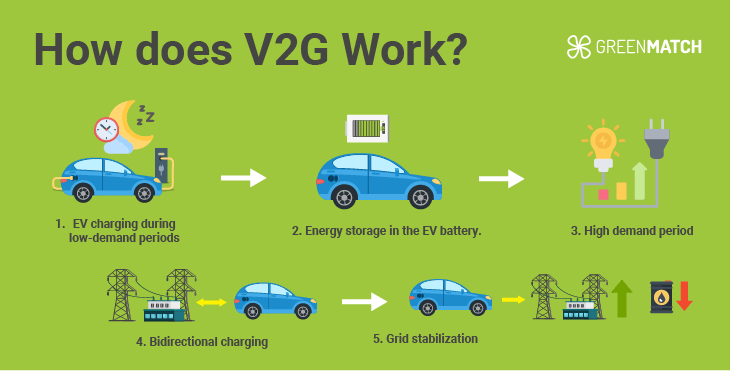Syllabus :GS 3/Science and Technology
In News
- The Kerala State Electricity Board (KSEB) and IIT Bombay have initiated a pilot project to explore the implementation of V2G technology across the State.
- Though, V2G in India is still at a nascent stage.
Vehicle-to-Grid (V2G) Technology
- Vehicle-to-Grid (V2G) technology is a transformative solution aimed at enhancing the sustainability and resilience of electric grid infrastructure.
- It allows Electric Vehicles (EVs) to send power back to the electricity grid when not in use, acting as decentralized energy storage. It enables both
- G2V (Grid to Vehicle) – charging EVs from the grid.
- V2G (Vehicle to Grid) – discharging power from EVs to the grid.
- It supports renewable energy integration, demand response, and grid stability.
- Smart charging and Time of Use (ToU) tariffs are key tools to manage this.

Benefits
- It can manage peak demand and avoid grid overload.
- It can store excess solar energy during the day and use it at night.
- It improves grid stability by modulating variable renewable energy.
- Utilities can use smart charging, well-designed tariffs, and financial incentives to encourage V2G adoption and truly decarbonise transportation.
Challenges
- The implementation of Vehicle-to-Grid (V2G) services faces complex and region-specific regulatory landscapes.
- Key challenges to effective V2G integration include technical difficulties, data security, and fragmented regulations.
- A major technical issue is the unpredictable and irregular availability of EVs for grid services due to varied charging behaviors.
Global Application
- V2G is already active in Europe, the U.S., and the U.K., where EV owners are compensated for returning energy during peak demand.
- In California, it supports grid stability and emergency power during crises.
Conclusion and Way Forward
- V2G technology has the potential to provide grid services such as peak power support and spinning reserves while also acting as renewable energy storage.
- Data-driven optimization of EV charging can enhance grid reliability amid rising EV usage and distributed energy resources.
Source :TH
Previous article
Making Primary Health Care Visible, Accessible, and Affordable
Next article
India’s Trade Deficit with China Widened